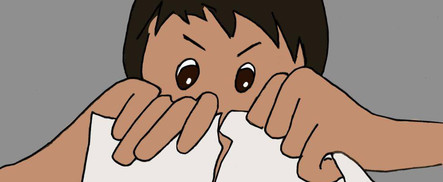
Encounter #1: I have an awkward hour to pass before a medical appointment, so I stop to work at a Starbucks attached to a Chapters that I have only been to once or twice. I order my eggnog latte, stuttering as one does, and as the barista listens with a poised sharpie she asks: “It’s Josh right?” I smile and play it cool while I’m actually thinking “How the hell do you remember my name?!” Oh right, I’m the stutterer.
Encounter #2: Two hours later I meet my parents at another coffee shop across the city. As we leave I stop to ask about an electric grinder for sale behind the counter. The barista, not the same one who earlier took our orders, opens his mouth and answers my stutter with one of his own. A dysfluent dance opens between us as we discuss the pros and cons of this mid-range grinder. I leave without the coffee grinder yet with a smile—fortunate to have stumbled upon dysfluency in a fluent world.
Let’s get the obvious out of the way: I apparently spend too much time at coffee shops. Beyond this fact, there seems to be something really different about these two encounters. In the first experience I was identified as that guy who stutterers through my dysfluency. The first thing that popped into my head were the opening lines of “Honest Speech,” where Erin remarks: “The barn owl communicates with its mates and offspring using a complex system of hissing, screeching, squawking, and facial muscle manipulation / Survival is dependent upon creating a voice so unique it can be recognized by loved ones in an instant.” Was I an owl perched in a Starbucks line?
The first intuition is yes, however the issue is complicated. My unique hissings and squawks reveal me to be a singular being that others can recognize. Yet there is an important difference between being recognized as a singular being as opposed to identified a type of person—that is, “a stutterer.” The second is an identity, a subject of a usually medicalized discourse. A “stutterer” is an identity that our culture understands because it is an identity that they have created and thus control. There is nothing unique nor singular about being a “stutterer.” I have been identified as a “stutterer” through my speech many times, and this is almost always an act of erasing dysfluency, of reducing it and myself to an identity that can be understood and managed.
In the capitalist context of a Starbucks line, calling me “Josh” seems to be recognizing my singularity rather than my identity as a “stutterer.” What caused the barista to remember me? My unique voice or the fact that I was a stutterer? These options are of course not mutually exclusive, but it may be helpful to consider the context. Baristas write names on coffee cups to give the feeling of connection. This feeling is part of the experience you pay for. In more fancy coffee shops, I have been told, the person behind the till writes down a distinguishing characteristic on the order—e.g. black coat, red hair—so that the other baristas can look directly at you when calling your name. As if that latte was made with care just for you. Calling anyone by name in this context is a calculated play at recognizing our singularity. Whether or not the barista last week identified me in my dysfluent singularity, rather than “that stutterer,” is ultimately beside the point.
Compare this to the second encounter. The wonderful thing about encountering dysfluency as dysfluency is the lack of need to make sense of it by labelling it. We were not two stutterers engaged in a halting act of communication, but an unexpected eruption of dysfluency in the world. There is far more dysfluency in the world than most people would like to admit. In fact, the idea of a “fluent world” is a fiction that can only be maintained through a sustained effort of covering up and smoothing over dysfluency. Encountering dysfluency enlivens me because of its honesty. As Erin says, “The sstuttering is the most honest part of me.” This is true not because stuttering represents some deep and authentic truth about who I am—a stutterer—but because the dysfluency of my voice “is how I know I still have a voice, I am still -being heard.” I participate in the world dysfluently and help to create a dysfluent world through my unique squawks and screeches. It is in these specific actions that I can be recognized; these squawks do not point to a general truth about my (medical and social) identity as a “stutterer.” They rather point to me here in this specific and fleeting moment.
Desiring and expecting dysfluency in the world is perhaps a far better model than the way stuttering is used to label us. We don’t need to find and join with other “stutterers,” we need collectively to create a more dysfluent world.
-Josh





 RSS Feed
RSS Feed
